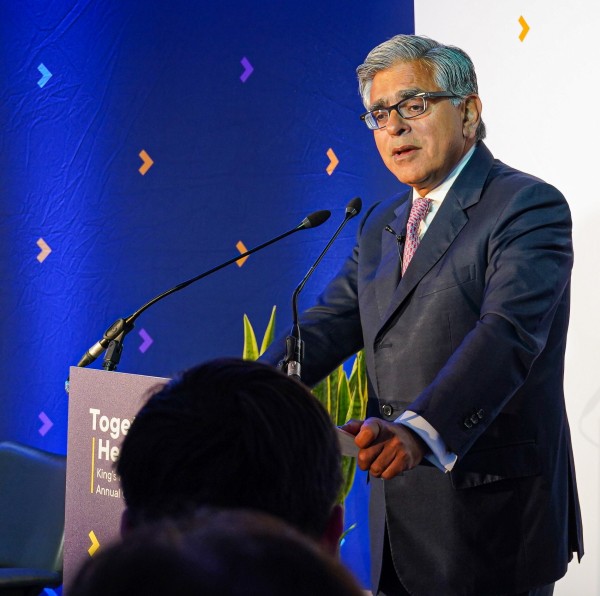We work with a range of partners across south east London and beyond.
South and south east London
The Health Innovation Network (HIN) South London is the health innovation network for south London, one of 15 across England. Health Innovation Networks are the bodies uniquely established to connect NHS and academic organisations, local authorities, the third sector and industry, in order to increase the spread and adoption of innovation across large populations, at pace and scale.
South East London ICS is a partnership that brings together the organisations responsible for publicly funded health and care services in south east London, to make the greatest possible contribution to the health and wellbeing of people living in our six boroughs.
This includes the Integrated Care Board, NHS health services, six Local Authorities and organisations from the voluntary, community and social enterprise sector.
SE London ICS is responsible for allocating public money as well as planning and delivering a wide range of health and care services. The ICS uses its combined resources to tackle of some of the biggest health issues affecting local people in Bexley, Bromley, Greenwich, Lambeth, Lewisham and Southwark.
We have formed a Strategic Alliance with St George’s Healthcare NHS Foundation Trust and St George’s, University of London that will share best practice in research and the education and training of students and health professionals.
The NIHR Maudsley Biomedical Research Centre (BRC) brings together scientists, clinicians, allied health professionals, service users and carers from across South London and Maudsley NHS Foundation Trust and the Institute of Psychiatry, Psychology & Neuroscience at King's College London.
The centre delivers experimental medicine and early phase translational research in clinical disorders, including mental health, dementia, pain, substance use, smoking, alcohol and obesity. Its aim is to accelerate the translation of the latest scientific discoveries into first-in-man clinical trials and other well-designed studies. The findings from these studies can then be developed and implemented to produce new tests and treatments for people with mental and neurological disorders.
King’s College London hosts one of the UK’s 18 Experimental Cancer Medicine Centres of scientific and clinical excellence. There is a national network of experimental cancer medicine centres, which has been funded by Cancer Research UK and the Department of Health.
We host two NIHR Clinical Research Facilities for Experimental Medicine – one at Guy’s and St Thomas’ and one at South London and Maudsley.
The King’s Clinical Research Facility is a pioneering collaboration involving the NHS, academia and industry to support world-leading research across physical and mental healthcare.
In 2022, Guy’s and St Thomas’ NHS FT was awarded £11.8m for a Clinical Research Facility to allow it to continue providing the state-of-the-art facilities and staff needed to conduct ground-breaking experimental medicine studies.
The NIHR Applied Research Collaboration South London brings together researchers, health and social care practitioners, and local people to improve health and social care in south London. Its applied research is designed to solve practical problems faced by local health and social care services. The aim is to help local NHS and social care services offer excellent care, based on sound evidence.
Guy’s and St Thomas’ NHS FT and King’s College London will set up a new HealthTech Research Centre focussing on cardiovascular and respiratory medicine.
The centre, based at St Thomas’ Hospital, will work with industry and academic partners as a new “one stop shop” to develop new technologies, medical devices and digital solutions to benefit patients.
The Medical Research Council Centre for Neurodevelopmental Disorders at King’s College London opened in November 2016 and is directed by Professor Oscar Marín. The Centre brings together world-leading researchers engaged in identifying the biological mechanisms that underlie developmental brain disorders. Our mission is to translate this knowledge into the clinical advances that will change the lives of all those affected.
The UK Dementia Research Institute (UK DRI) brings together world-leading expertise in biomedical, care and translational dementia research. It carries out research relevant to all dementias, including Alzheimer’s disease, Parkinson’s disease, frontotemporal dementia, vascular dementia, Huntington’s disease and beyond. The UK DRI Hub is based at University College London, and Centres are hosted at University of Cambridge, Cardiff University, The University of Edinburgh, Imperial College London, King’s College London and the University of Surrey.
MedCity is the cluster organisation for the world-leading health and life sciences sector in London. The organisation acts as a convener, connector and catalyst – identifying opportunities and pathways for businesses and researchers to work together to develop and commercialise the best innovations.
It is a not-for-profit organisation funded by the Greater London Authority and Research England. The MedCity mission is to transform the healthcare landscape of London and advance cutting-edge health and life sciences innovation.
Across King’s Health Partners there are specialist research centres focussing on certain clinical and scientific areas:
- British Heart Foundation Centre of Research Excellence was established in April 2008 to promote leading research and training in cardiovascular research.
- Breast Cancer Now Research Unit opened in November 2007. Researchers at the unit investigate the molecular pathology and biology of invasive breast carcinoma to identify and validate novel therapy targets, prognostic factors and biomarkers for these poorly-understood forms of breast cancer.
- Centre for Stem Cells and Regenerative Medicine focuses on how the differentiated state of adult tissues is maintained, by using mammalian skin as a model system. Current projects are concerned with self-renewal and lineage selection by human and mouse epidermal stem cells, and the role of stem cells in tumour formation.
- The Centre for Developmental Neurobiology aims to understand the mechanisms that control brain development and how deviations from the normal plan lead to disease. The Centre has a team of over 130 researchers and is part of the Institute of Psychiatry, Psychology and Neuroscience, King’s College London.
- NIHR Clinical Research Network (CRN) South London - This network provides the infrastructure that enables high-quality clinical research to take place in the NHS across South London, supporting studies in all areas of disease and clinical need including health and social care. The Network is hosted by Guy's and St Thomas' NHS Foundation Trust and aims to increase the opportunities for patients to take part in clinical research.
-
The Cell Therapy Catapult was established by the Technology Strategy Board in 2012 to grow the UK cell therapy industry, increasing health and wealth for all. Cell-based therapies will play a vital role in the next generation of healthcare, and the Catapult’s aim is for the UK to become a global leader in their development and commercialisation. The Cell Therapy Catapult is based at Guy’s Hospital.
- The Francis Crick Institute – is a national institute for biomedical research focusing on new ways to diagnose, treat and prevent diseases. Its innovative approach involves interdisciplinary collaborative research in an environment designed to bring together different scientific disciplines and encourage new discovery through shared science. The translation of discovery to treatment is made possible through its three university partners. The Crick is a partnership between three major funders of UK biomedical research, The Medical Research Council (MRC), The Wellcome Trust, Cancer Research UK, and three world-leading London-based University partners, King’s College London, UCL and Imperial College London.
- Mental Health Research Network – is run by the Institute of Psychiatry at King’s College London and the University of Manchester. The Mental Health Research Network is part of the National Institute for Health Research and their mission is to help make research about mental health happen within the NHS in England.
- Rare Diseases Translational Diseases Collaboration - this partnership, made up of Biomedical Research Centres, biomedical research units and clinical research facilities, is to provide research infrastructure that harnesses the strength of the NHS to support discoveries and translational research on rare diseases.
The European University Hospital Alliance (EUHA) was formed in 2017 with the commitment of nine of the best university hospitals in Europe to share their expertise in health care, research and education.
University hospitals play an important role in driving innovation and translating this into practice. Through the alliance our members aim to play an active role in shaping the future of European health care, learn from each other to maximise patient outcomes and combine efforts to drive high quality research.
King's Global Health Partnerships (KGHP) works with health facilities, academic institutions, and governments to strengthen health systems and improve the quality of care in Somaliland, Sierra Leone, the Democratic Republic of Congo, and Zambia.
KGHP brings together expertise from King’s College London, King’s Health Partners’ NHS Foundation Trusts, and international partners to:
- Educate, train and support healthcare workers
- Strengthen healthcare and training institutions
- Enhance national health policies and systems
KGHP connects UK and African health professionals, providing training, mentoring and hands-on support; and undertake collaborative research to inform policy and practice. KGHP also supports partners by providing access to funding, networks, and development opportunities.
King’s Global Health Partnerships recruits hundreds of volunteers from the UK’s National Health Service (NHS) and internationally, and connects them with health professionals in Somaliland, Sierra Leone, the Democratic Republic of Congo, and Zambia.
Through these long-term partnerships, KGHP promote skills and knowledge exchange, and mutual learning that contribute to building a stronger health workforce and improved quality of healthcare both internationally and back in the UK.
Find out more about the volunteering scheme and sign up for future opportunities.
You can also learn more about the impact of KGHP here.
Follow King’s Global Health Partnerships
Subscribe to KGHP’s newsletter here for project updates and volunteering opportunities.







